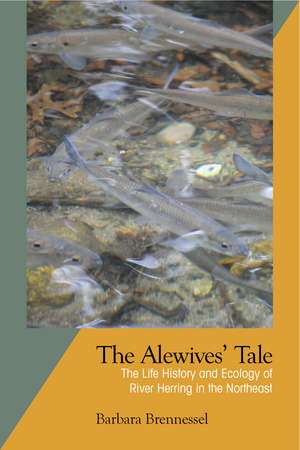The Alewives' Tale: The Life History and Ecology of River Herring in the Northeast
Autor Barbara Brennesselen Limba Engleză Paperback – 28 aug 2014
While on vacation in 1980, biologist Barbara Brennessel and her family came across an amazing sight: hundreds of small silver fish migrating from the Atlantic Ocean, across a channel connecting two ponds in the town of Wellfleet on Cape Cod. She later learned that these tiny river herring were important for the ecology and economy of the region and that volunteers were counting fewer and fewer fish migrating each year.
The Alewives' Tale describes the plight of alewives and blueback herring, two fish species that have similar life histories and are difficult to distinguish by sight. Collectively referred to as river herring, they have been economically important since colonial times as food, fertilizer, and bait. In recent years they have attracted much attention from environmentalists, especially as attempts are being made, on and beyond Cape Cod, to restore the rivers, streams, ponds, lakes, and estuaries that are crucial for their reproduction and survival.
Brennessel provides an overview of the biology of the fish—from fertilized eggs to large schools of adults that migrate in the Atlantic Ocean—while describing the habitats at different stages of their life history. She explores the causes of the dramatic decline of river herring since the mid-twentieth century and the various efforts to restore these iconic fish to the historic populations that treated many onlookers to spectacular inland migrations each spring.
The Alewives' Tale describes the plight of alewives and blueback herring, two fish species that have similar life histories and are difficult to distinguish by sight. Collectively referred to as river herring, they have been economically important since colonial times as food, fertilizer, and bait. In recent years they have attracted much attention from environmentalists, especially as attempts are being made, on and beyond Cape Cod, to restore the rivers, streams, ponds, lakes, and estuaries that are crucial for their reproduction and survival.
Brennessel provides an overview of the biology of the fish—from fertilized eggs to large schools of adults that migrate in the Atlantic Ocean—while describing the habitats at different stages of their life history. She explores the causes of the dramatic decline of river herring since the mid-twentieth century and the various efforts to restore these iconic fish to the historic populations that treated many onlookers to spectacular inland migrations each spring.
Preț: 183.94 lei
Preț vechi: 197.60 lei
-7% Nou
Puncte Express: 276
Preț estimativ în valută:
35.20€ • 36.94$ • 29.21£
35.20€ • 36.94$ • 29.21£
Carte indisponibilă temporar
Doresc să fiu notificat când acest titlu va fi disponibil:
Se trimite...
Preluare comenzi: 021 569.72.76
Specificații
ISBN-13: 9781625341051
ISBN-10: 1625341059
Pagini: 184
Ilustrații: 17 b&w illus.
Dimensiuni: 152 x 229 x 20 mm
Greutate: 0.29 kg
Ediția:First Edition
Editura: University of Massachusetts Press
Colecția University of Massachusetts Press
ISBN-10: 1625341059
Pagini: 184
Ilustrații: 17 b&w illus.
Dimensiuni: 152 x 229 x 20 mm
Greutate: 0.29 kg
Ediția:First Edition
Editura: University of Massachusetts Press
Colecția University of Massachusetts Press
Notă biografică
Barbara Brennessel is professor emerita of biology at Wheaton College. She is author of Diamonds in the Marsh: The Natural History of the Diamondback Terrapin and Good Tidings: The History and Ecology of Shellfish Farming in the Northeast.
Recenzii
"Brennessel has put this book together well. The reader will find all the information that is available, neatly packaged, on alewives and herring."—Daniel Pauly, University of British Columbia
"Biologist Brennessel has written a very readable, evenhanded account of the many complex issues that impact the continued survival of river herring. Recommended."—Choice
"I believe this book will greatly interest citizen scientists interested in learning more about eh significance of these forage fish, and those interested in playing a role in the restoration of this once-thriving fishery."—Ecology
"Biologist Brennessel has written a very readable, evenhanded account of the many complex issues that impact the continued survival of river herring. Recommended."—Choice
"I believe this book will greatly interest citizen scientists interested in learning more about eh significance of these forage fish, and those interested in playing a role in the restoration of this once-thriving fishery."—Ecology
